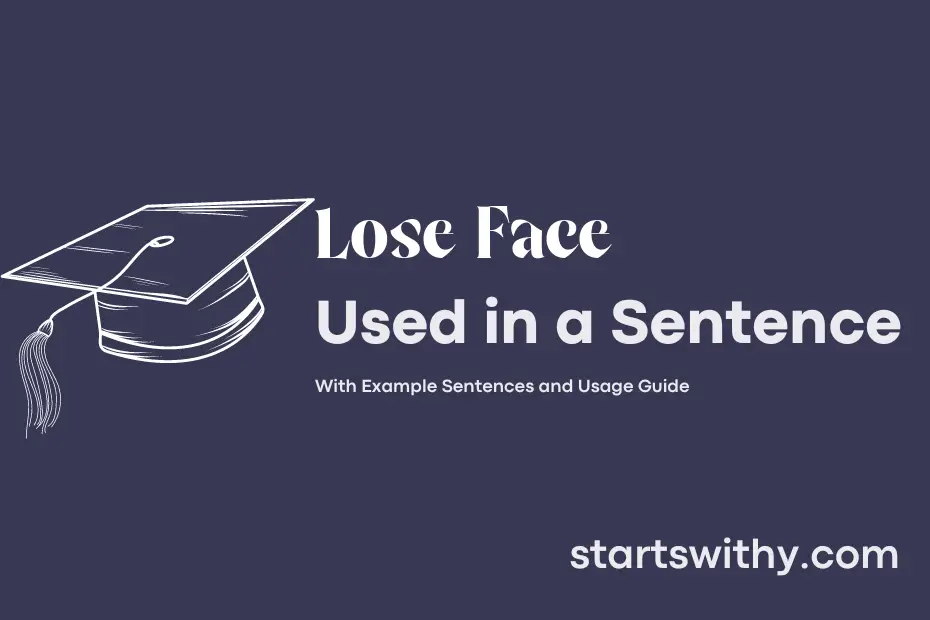“Losing face” is a common expression used to describe the embarrassment or loss of respect experienced when someone’s reputation or dignity is damaged in public. This phrase, often seen as a cultural concept in various societies, points to the social consequences or shame associated with making a mistake or showing weakness in front of others.
The fear of losing face can influence decision-making, behavior, and interactions in many cultures, as individuals strive to maintain a positive image and avoid public humiliation. Whether in personal relationships, professional settings, or social gatherings, the avoidance of losing face is often a powerful motivator that can shape how individuals present themselves and navigate social situations.
7 Examples Of Lose Face Used In a Sentence For Kids
- Lose face means feeling embarrassed.
- We shouldn’t tease others and make them lose face.
- It’s important to be kind so nobody has to lose face.
- When we make mistakes, we may lose face.
- Everybody makes mistakes, so it’s okay to lose face sometimes.
- Let’s help each other so nobody has to lose face.
- Apologizing when we are wrong can help us not lose face.
14 Sentences with Lose Face Examples
- Lose face by failing to submit your assignment on time.
- Lose face in front of your professors by not being prepared for a presentation.
- Lose face by getting caught cheating on an exam.
- Lose face by forgetting important information during a class discussion.
- Lose face by being unprepared for a group project meeting.
- Lose face by receiving a low grade on a test you thought you did well on.
- Lose face by being unable to answer a question during a debate.
- Lose face by missing a deadline for a research paper.
- Lose face by not participating in extracurricular activities and networking events.
- Lose face by failing to meet expectations during an internship.
- Lose face by not dressing appropriately for a professional event.
- Lose face by making a careless mistake in a lab experiment.
- Lose face by not being able to speak confidently during a job interview.
- Lose face by forgetting to bring necessary materials to a class presentation.
How To Use Lose Face in Sentences?
Lose Face means to suffer a loss of respect or reputation, usually due to a mistake or embarrassing situation. Here’s how to use it in a sentence:
- Use “Lose Face” as a verb: “She will lose face if she doesn’t apologize for her actions.”
- Use it with prepositions: “He doesn’t want to lose face in front of his coworkers.”
Remember to always position the words “Lose Face” properly within the sentence, as it acts as a verb or phrase. Make sure to use it in the right context where someone’s reputation or credibility is at stake. This term is often used in social and professional settings when discussing situations that could possibly damage one’s standing in the eyes of others. Be mindful of the tone and context when using “Lose Face” to ensure that it is used appropriately. With practice and observation, you will become more comfortable incorporating it into your conversations.
By following these guidelines and examples, you should be able to confidently use “Lose Face” in your conversations and writing. Remember that practice makes perfect, so don’t hesitate to incorporate this term into your everyday language to become more fluent in its usage.
Conclusion
In various social and cultural contexts, sentences involving “lose face” highlight the significance of reputation, honor, and social standing. These phrases convey the idea of experiencing embarrassment, shame, or loss of respect in front of others due to a particular action or situation. Whether it’s in personal relationships, professional settings, or societal interactions, the fear of losing face can shape individuals’ behaviors and decisions.
Understanding the implications of “lose face” sentences can help individuals navigate social dynamics more effectively and be mindful of their actions’ potential impact on their reputation. By being aware of how certain behaviors or choices may lead to losing face, individuals can make more informed decisions to uphold their honor and integrity in various interpersonal and professional interactions.



